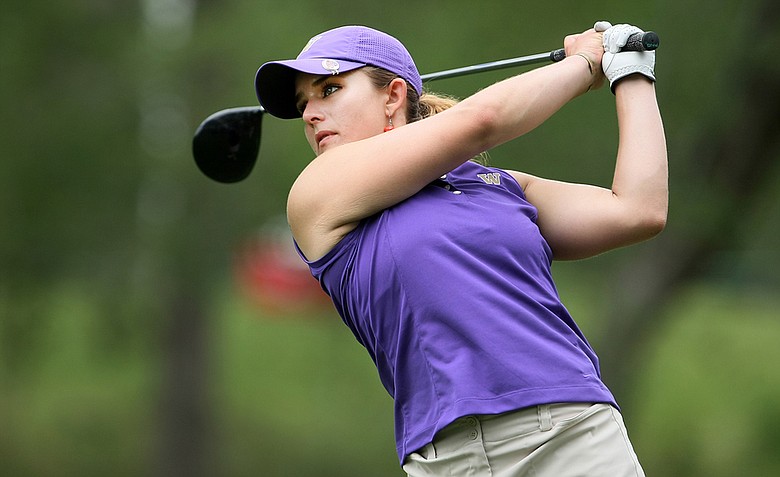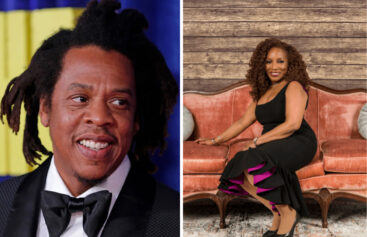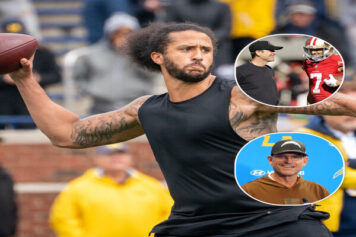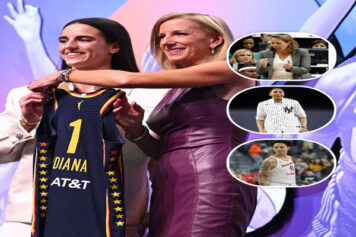There is a great deal of irony that I am speaking with you tonight because when I earned my tour card 16 years ago on the LPGA I was told theres only two things you dont talk about in public: faith and politics. Well tonight, Im prepared to violate both those admonitions as I stand before you at the Republican National Convention.
Pro golfer, Natalie Gulbis uttered these words as she stood on the stage in Cleveland, endorsing Donald Trump as the Republican nominee two months ago. This was during a time when WNBA players were punished for wearing Black Lives Matter shirts during the anthem. This was before Colin Kaepernick was told to go to live in another country if he didnt like America, when he decided not to stand for the national anthem, with the hope to bring awareness to the injustices many people face here.
Natalie Gulbis did not receive public scorn for exercising her right to endorse who she saw fit. Sure, she was made of fun by some, but the tour did not fine her and no one told her to leave the country.
This is not the first time an athlete has shared his or her beliefs, nor will it be the last. Athletes have a platform with their fan base to reach an audience that may not have cared about politics before. And while its tough to gauge how big of a celebrity name one has to have to in order to really influence votes, the allure of an athlete, someone who makes millions playing a sport and undoubtedly someone who has fans that reach across all aisles of the political spectrum, is fascinating.
While Gulbis gave her speech, I reflected on my time in competitive and professional golf and wondered if the sport influenced my political views. I did not grow up playing at a country club, but I also grew up in an area where golf was a luxury.
In Gallup, New Mexico poverty is rampant and the ramifications of forced assimilation for Native Americans cannot go unseen. In fact, Gallup was recently ranked as the most “dangerous city” in New Mexico by a recent FBI report for Native Americans.
My father was the head pro at the only golf course in the city. An immigrant from Mexico, my dad had adopted what he felt were American values, and became a U.S. citizen during the Reagan administration. My father held the conservative value of pull yourself up by your bootstraps, but still, he wanted to make golf accessible to the youth in Gallup, and would host golf clinics for $10 a person, or would allow kids to come and help in the pro-shop or pick up the range in exchange for playing and practice privileges.
My fathers story though, despite his immigrant status, was by no means the type of story we hear in the media about immigrants. He grew up in a very wealthy family: he had nannies, a chauffeur, went to a private school in Mexico City, and his family were members at Club de Golf Mexico, a prestigious country club.
Still, of course life was different in the U.S. for my father, and he had to overcome racial discrimination. In fact, he made the choice to not speak Spanish in front of my sister and I with the fear that if we spoke Spanish wed face similar discrimination.
So, how does this all tie into how golf influenced my politics?

(Photo Credit: golfchannel.com)
Since I played competitive golf as a junior and all the way through my mid twenties, I experienced being confronted with the haves and the have-nots. Even though I did not grow up on a fancy golf course, I was privileged enough to play a sport that costs hundreds of dollars to begin playing, and thats on the low end. I had free instruction since my dad taught me, and access to the golf course whenever I pleased. Even when I moved to Tulsa, Oklahoma after my parents divorced, golf courses granted me free playing privileges since my father was a golf pro.
Of course I did not recognize this privilege as a child. It was not until I moved high schools my sophomore year that I realized life is different for a majority of people, and having the opportunity to play golf is the last thing on their priority list.
My freshman year of high school I attended a magnet school in the north side of Tulsa, a part of town that many people consider the ghetto. In an area riddled with gang violence and poverty, Booker T. Washington high school was a beacon of hope and a shining example of educational superiority. Students from all races and incomes flooded the hallways and each day when I bused into the neighborhood I saw the dilapidated houses next door to the brand new school building. The contrast was hard to ignore.
Booker T. Washington did not have a great high school golf team, and while I excelled in school, I knew the only way I would receive a full scholarship to a university was if I received a college golf scholarship. So my mother moved school districts and I went to the Jenks High School, on the south side of Tulsa.
The difference between the north and south side of Tulsa is quite literally night and day. Jenks boasted itself in having a top athletic program across the board, and golf was no exception. Students drove brand new BMWs and Mercedes and wore designer clothing.
All the girls on my golf team came from upper-middle class families. One girls parent owned a plane and flew to pick her up at a golf event because she did not like the town we were competing in. For the first time in my life, I felt like one of the have-nots. They all had memberships to a country club, while I still practiced at local municipal courses.
This affected me because this where I began to see privilege play itself out. When I saw the difference from the north and south side, I realized I was privileged enough that my family could afford to move to another school district to give me opportunity.
I did go on to earn a full ride at the University of Washington and played professionally for four years. I worked hard and hustled to find sponsors, but I noticed a change within me when I started to play golf professionally. I stopped caring about privilege and began to feel entitled.

(Anya Alvarez at The University of Washington, Photo Credit: golfweek.com)
I demanded certain things simply because I was a professional athlete. I was isolated from the real world. I practiced at country clubs among millionaires and when I played on the LPGA, I assure you we did not have events in undesirable areas. We often played at private clubs and we sequestered ourselves to the areas where the tournaments were held. When you do that long enough, it becomes relatively easy to forget that playing golf is inaccessible to most and not a realistic expense for many people to take seriously.
Once I realized my privilege within the golf world though, it began impacting who I supported in elections and what I believed made a good candidate. For me, economic inequality and the lack of funding for programs in our public schools is my main concern.
So when Natalie Gulbis gave her speech at the convention, I wondered, had golf influenced her beliefs? I struggle with the fact that she had the privilege to give the speech with no qualms from the LPGA tour, yet the WNBA players who wore Black Lives Matter shirts were fined and told to stay silent.
I struggle with the fact that women of color, who have been impacted by systemic racism, were told to not stand up for a cause they justly and rightly believe in. At least 90 percent of the league is African American, so not allowing them to use their platform to advocate for the communities they come from and to reach a fan base that perhaps may not have paid much attention to the racial issues affecting our country today, saddened me.
That night, I saw a woman who plays a sport mainly for the privileged, have the opportunity to speak her mind freely with no consequences. For the record, her choice of president has no impact on my opinion of her. I know her to be a kind and generous person who gives back often, as not too long ago she opened a Boys & Girl Club in Las Vegas and is considered one of the most charitable players on tour.
However, it is not lost on me her privilege played itself out when compared to black athletes who are asked to remain silent or choose different forms of protest that dont make us uncomfortable.
I do believe the sport one plays can impact political beliefs. It should surprise no one that golfers are generally more conservative and vote Republican. Our sport shields us from the real world and our unawareness of that fact can affect the platforms we choose and the issues we advocate.
However, this is not a criticism, but an observation. Every athlete who publicly advocates for a cause should take the time to reflect on where those beliefs stem from. When we stand on our podium afforded to us because of the sport we play, careful thought and consideration should take root and precedence.
There is an incredible amount of responsibility an athlete bears when he or she decides to use their voice. When that choice is made though, an athlete should take into consideration his or her privilege to speak freely, while others are often shamed into silence.



